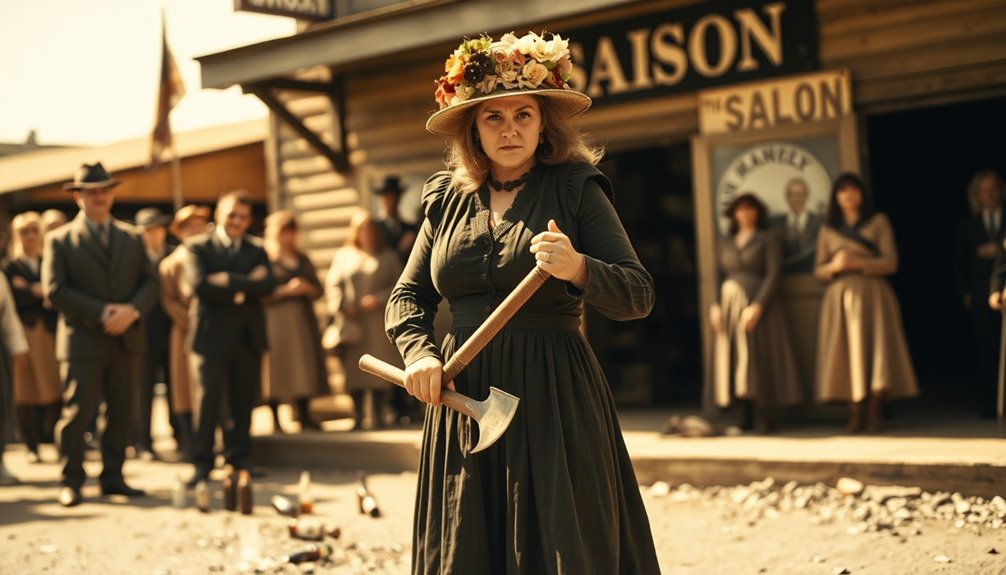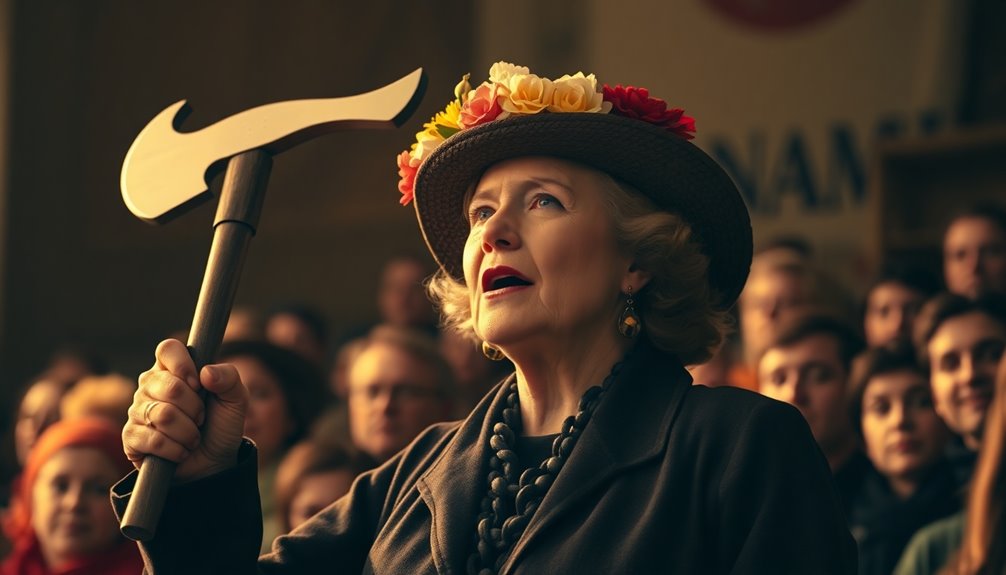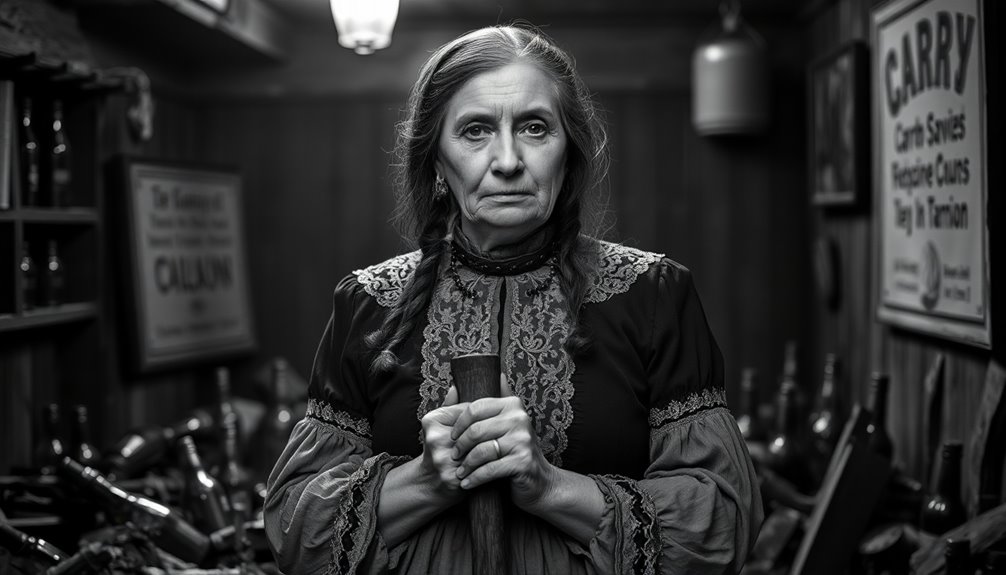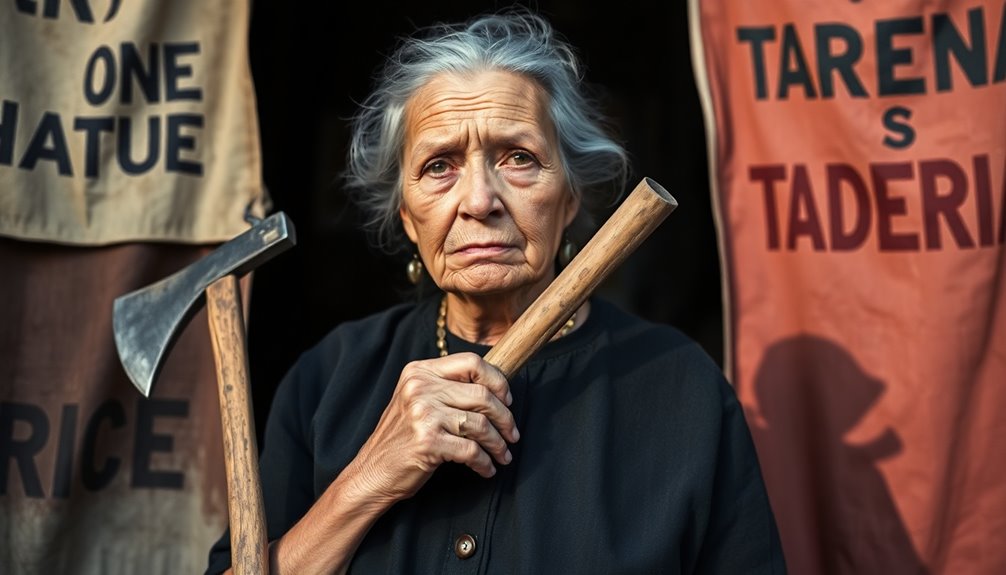Carry Nation was a pioneering temperance activist born on November 25, 1846, in Kentucky. Facing personal struggles, including the devastating effects of alcohol in her marriages, she became determined to fight against liquor. Nation famously used a hatchet to smash saloons, earning her the title "Bravest Woman in Kansas." Her activism extended beyond temperance; she championed women's suffrage and established shelters for alcohol-affected families. Continuing her fight until her health declined, she left a lasting legacy in American history. To fully appreciate her influence and bold actions, there's much more to uncover about her extraordinary journey.
Key Takeaways
- Born in 1846 in Kentucky, Carrie Nation faced poverty and personal struggles that fueled her activism against alcohol.
- She became a prominent leader in the temperance movement, founding a local branch of the Women's Christian Temperance Union.
- Nation's aggressive tactics, including "hatchetations," led to numerous arrests and earned her the title "Bravest Woman in Kansas."
- She linked temperance with women's suffrage, advocating for voting rights and influencing the Nineteenth Amendment through public speeches and publications.
- Carrie Nation continued her activism until her death in 1911, leaving a lasting legacy on temperance and social reform movements.
Early Life and Background

Although Carrie Nation was born on November 25, 1846, in Garrard County, Kentucky, her early life was shaped by constant upheaval. You might say her childhood was marked by instability, as her family moved multiple times during her formative years. When she was just five, they relocated to Boyle County and then to Woodford County. By the time she was nine, they left Kentucky altogether for Missouri.
Growing up on a large farm, Carrie faced poverty, dealt with her mother's mental health struggles, and endured frequent illness. In 1854, her family settled at High Grove Farm near Belton, Missouri. The Civil War brought further disruption, leading them to Kansas City and eventually Texas, where Carrie took on the responsibility of nursing wounded soldiers. This experience would later shape her involvement in the temperance movement as she sought to combat the social issues surrounding alcohol.
Despite these hardships, Carrie managed to obtain a teaching certificate, although her education was inconsistent. She participated in various religious and civic activities, and her deep faith began to influence her journey. By the time she became involved with the Women's Christian Temperance Union, her early experiences had already laid a foundation for her future activism.
Marriages and Personal Struggles

Carrie Nation's personal life was marked by tumultuous relationships that greatly influenced her activism. Her first marriage to Charles Gloyd began on November 21, 1867, but quickly soured due to his severe alcoholism, which she discovered only after they wed. Pregnant and unable to rely on Gloyd's support, she returned to her family home. Tragically, Gloyd died from alcoholism just six months after their daughter, Charlien, was born. This experience fueled Carrie's hatred for liquor and its devastating effects on families, as Charlien also suffered health issues linked to her father's addiction. Additionally, her childhood experiences shaped her views on family and community, which would later inform her activism.
Carrie's second marriage to David Nation on December 30, 1874, brought new challenges. Though David was a lawyer, preacher, and journalist, the couple frequently disagreed over religious beliefs and charitable endeavors. David's resignation as a preacher due to controversies tied to Carrie's actions strained their relationship further. Ultimately, he filed for divorce in 1901, citing her commitment to the antisaloon movement as desertion. Despite this setback, Carrie persisted in her temperance work, undeterred by public scrutiny or lack of support from her ex-husband.
Joining the Temperance Movement

Why did Carrie Nation become a prominent figure in the temperance movement? It all started with her deep-seated belief that alcohol was a destructive force in society. After relocating with her family to Kansas during the Civil War, Carrie became involved in various charitable and religious activities, eventually founding a local branch of the Women's Christian Temperance Union (WCTU) in Medicine Lodge. Her commitment to enforcing Kansas' ban on liquor sales showcased her determination.
Carrie's activism was fueled by a divine vision she claimed to have received, directing her to "smash" saloons. This conviction led her to take dramatic actions against establishments serving alcohol, using rocks and bricks to destroy them. During this time, she often dressed in black-and-white clothing while engaging in her activism.
Key aspects of her early involvement include:
- Organizing support for the poor through meals and clothing drives
- Establishing a shelter for families affected by alcoholism
- Gaining inspiration from her vision, which she believed justified her actions
Carrie's relentless efforts not only marked her as a key figure in the temperance movement but also set the stage for her future activism. Her journey was just beginning, and she was ready to make waves in the fight against alcohol.
Activism and Notable Methods

As Carrie Nation's commitment to the temperance movement deepened, her methods evolved from peaceful protests to more aggressive tactics. You might first find her serenading saloon patrons with hymns, but soon, she greeted bartenders with pointed remarks like, "Good morning, destroyer of men's souls." After praying for direction, she claimed a heavenly vision that compelled her to destroy saloons. This marked the turning point where she began using rocks to smash saloons, embracing violence as part of her activism.
Carrie's iconic symbol became the hatchet, a weapon suggested by her husband. She even sold pewter hatchets as souvenirs to fund her legal battles. Besides hatchets, she used rocks, bricks, and billiard balls to wreak havoc on saloons, often rallying women with cries like, "Smash. Smash. Praise God, Women. Come on. Smash the Windows." Her commitment was further fueled by her belief that alcohol's detrimental effects could only be countered through such drastic actions.
Her aggressive tactics led to over 30 arrests between 1900 and 1910 for her "hatchetations." Despite facing violence from mobs, she gained support from some communities, earning the title "To the Bravest Woman in Kansas," solidifying her role in the temperance movement.
Social and Political Advocacy

Social and political advocacy became a cornerstone of Carrie Nation's mission, intertwining her temperance efforts with a broader push for women's rights. You can see how her commitment to these causes shaped her life and work. Carrie strongly believed that the fight against alcohol was linked to the empowerment of women, which drove her to organize marches in Topeka, Kansas, and advocate for women's suffrage.
Consider these impactful initiatives she championed:
- Founded a shelter for wives and children of alcoholics, paving the way for today's battered women's shelters.
- Organized local branches of the Woman's Christian Temperance Union (WCTU), promoting unity among women for social reforms.
- Engaged in community and charity work, including founding a sewing circle to provide clothing for the poor.
Through her lectures and activism, Carrie highlighted the critical roles women played in societal reform. She criticized the negative impacts of alcohol and tobacco, emphasizing the need for moral and social change. Her tireless efforts not only aimed to enforce prohibition laws but also sought to uplift and empower women, leaving a lasting legacy in both temperance and women's rights movements. Carrie was known for her raids on bars and confrontational tactics, which underscored her commitment to her cause.
Publications and Performances

Carrie Nation was a prolific writer and performer, using her talents to amplify her message against alcohol and promote women's rights. Through various publications, she captured public attention and rallied supporters for the prohibition cause. Notable works include:
| Title | Type | Year |
|---|---|---|
| The Smasher's Mail | Newspaper | 1895 |
| The Hatchet | Magazine | 1900 |
| The Use and Need of the Life of Carry A. Nation | Autobiography | 1904 (rev. 2006) |
| Faithful to the Cause of Prohibition | Publication | 1900s |
| The Home Defender | Newsletter | 1900 |
Alongside her writings, Nation set out on extensive lecture tours, earning up to $300 a week. She spoke passionately about the dangers of liquor and other societal issues across multiple states. Her dramatic performances, including her stage adaptation *Hatchetation*, showcased her commitment to her cause. Nation's public appearances often involved her trademark hatchets, making headlines and drawing both praise and criticism. Her activism against alcohol was instrumental in contributing to the passage of the Eighteenth Amendment. With her writings and performances, she became a fascinating figure in the temperance movement.
Legacy and Impact

Carry Nation's legacy is rooted in her fierce advocacy for prohibition and women's rights, making her a pivotal figure in early 20th-century social movements. Her relentless pursuit of these causes inspired many to join the fight, leaving a lasting impact on both the temperance movement and women's suffrage. Notably, her unique approach, known as hatchetation, involved direct action that drew attention to her cause and mobilized support for the temperance movement. You can see her influence in cultural discussions and social reforms that continue to resonate today.
Prohibition Advocacy Influence
Although her methods sparked controversy, Carry Nation undeniably left a lasting impact on the prohibition movement in the United States. Her radical approach, including hatchet-wielding raids on saloons, caught the attention of the nation and ignited debates about alcohol consumption. Through her actions, she highlighted the destructive nature of alcohol, and her efforts led to significant financial losses for many saloon owners.
Consider these key impacts of her activism:
- Increased Awareness: Nation's raids raised public consciousness about the dangers of alcohol, leading many to reconsider their own drinking habits. Her actions also prompted the establishment of shelters for families affected by alcoholism, which served as a precursor to modern social support systems.
- Legislative Influence: Her relentless campaigning contributed to the establishment of prohibition laws in various states, including Oklahoma Territory, which became a dry state in 1907.
- Cultural Icon: Dubbed "Hatchet Granny," she became a symbol of the temperance movement, inspiring both admiration and ridicule across the country.
Carry Nation's legacy is a reflection of her commitment to the cause. Despite the controversies surrounding her methods, her influence on the prohibition movement remains significant, and her story continues to resonate with those who advocate for social reform.
Women's Suffrage Contributions
Nation's commitment to social reform extended beyond her prohibition advocacy; she was also a passionate champion for women's suffrage. Even before women could vote in America, you could find her delivering public speeches that intertwined the messages of temperance and suffrage. She actively participated in suffrage parades, rallying support from the community. Through her work with the Woman's Christian Temperance Union (WCTU), she emphasized how vital voting rights were for women to enact social change.
Engaging in spirited public debates, Nation often challenged the status quo. During a notable debate in Seward, Nebraska, she robustly argued for women's suffrage, using biblical quotes to bolster her points. Her confrontational style and direct arguments attracted large audiences, revealing a growing public interest in the issue. In fact, her speeches drew significant crowds, indicating her popularity and engagement with local suffrage organizations to mobilize support.
Nation didn't work alone; she collaborated with fellow suffragists and temperance activists, effectively mobilizing local chapters to champion women's rights. Her publications, like *The Smasher's Mail*, served as platforms to promote the suffrage cause. Ultimately, her tireless efforts greatly influenced the push for the Nineteenth Amendment, inspiring future generations to continue the fight for women's rights.
Lasting Cultural Impact
Through her radical activism and fervent dedication to social reform, Carry Nation left a profound cultural impact that resonates even today. You can see her influence in the ongoing discussions about alcohol regulation and women's rights. Nation's unconventional methods sparked a national movement against alcohol, pushing the boundaries of the temperance movement and inspiring others to take action.
- Her nickname, "Hatchet Granny," became emblematic of a bold and confrontational approach to activism.
- She played a significant role in shaping prohibition legislation, especially in Oklahoma, helping the territory become a dry state.
- Nation's legacy continues to be debated and studied, highlighting the complexities of social reform in America.
Nation's fervor made her a polarizing figure, both revered and ridiculed, reflecting the divided views on prohibition. Her image has transcended time, becoming a part of bar-room folklore and a symbol of radical activism. Even now, her story is vital in understanding the broader societal discourse around alcohol and morality, solidifying her place in American history as a formidable advocate for change.
Later Life and Death

In her final years in Arkansas, you'll find Carry Nation continuing her activism from a place she called "Hatchet Hall," dedicated to helping women affected by alcoholism. Despite her declining health, she remained a passionate advocate for temperance and women's suffrage until her last days. After her death on June 9, 1911, her impact on the movement endured, with her burial site and legacy serving as reminders of her fierce dedication.
Final Years in Arkansas
After relocating to Eureka Springs, Arkansas, Carry Nation dedicated her later years to activism and community service. She purchased Hatchet Hall and nearby cottages to provide shelter for widows, abused women, children, and local school girls. Nation also established the "Carry A. Nation School," offering religious instruction and preparing meals for her boarders. This school was part of her broader mission to promote education for young women(Carry A. Nation School).
During this time, you'd see her continuing her temperance crusade, often pulling cigars and cigarettes from men's mouths on the sidewalk. She made speeches and organized local temperance groups, even facing multiple arrests for her activism. Significantly, she spoke at the opening of a new subdivision in Hot Springs and sold souvenir hatchets.
However, her health began to decline, culminating in a nervous breakdown in December 1910. On January 13, 1911, she delivered her final speech in Eureka Springs before slipping into a coma.
Her legacy wasn't just in her activism but also in her commitment to the community. Here are some highlights from her final years:
- Founded a school for local children.
- Supported and housed vulnerable women and children.
- Continued to actively oppose alcohol consumption.
Legacy of Activism
Carry Nation's relentless spirit defined her legacy of activism during her later years and ultimately shaped her impact on society. You'd see her tirelessly advocating for prohibition and women's suffrage, believing both were essential for societal reform. In 1904, she published her autobiography, *The Use and Need of the Life of Carry A. Nation*, detailing her journey and fueling her activism. Through lecture tours, including successful ones in Great Britain, she earned up to $300 a week, which funded her efforts and covered legal fines.
Her advocacy bore fruit, contributing to the enforcement of prohibition laws in Kansas and Missouri, and influencing new legislation that restricted alcohol sales even further. She wasn't just about temperance; you'd find her deeply involved in women's suffrage, emphasizing its importance during parades and rallies, believing it would reduce the need for her confrontational tactics. A key figure in the Women's Christian Temperance Union, Nation's involvement amplified the movement's impact and broadened its reach across the nation.
Nation also dedicated herself to charitable work, establishing homes for families affected by alcoholism and counseling prisoners. By the end of her life, her activism not only challenged societal norms but also laid the groundwork for future reforms in both prohibition and women's rights.
Burial and Remembrance
At 64 years old, Carry Nation's life came to a close on June 9, 1911, in Evergreen Place Hospital and Sanitarium in Leavenworth, Kansas, marking the end of her fierce activism. After relocating to Eureka Springs, Arkansas, due to declining health, she founded "Hatchet Hall," a home dedicated to her cause. Tragically, she collapsed during a speech in January 1911, foreshadowing her final days. Her last words, "I have done what I could," encapsulate her relentless spirit.
Carry was buried beside her mother in Belton, Missouri, a place chosen for its familial significance. Her grave is marked with the inscription, "She hath done what she could," a marker of her dedication.
- Historical Marker #1733 honors her birthplace in Lancaster, Kentucky.
- Carrie Nation Spring in Eureka Springs serves as a reminder of her impact.
- Various writings, including her autobiography, guarantee her legacy endures.
Through these memorials, Carry Nation's influence continues to inspire those who fight for justice and temperance even today. Her life and work remain etched in history, reminding us of the power of one person's convictions.
Frequently Asked Questions
What Motivated Carry Nation's Involvement in the Temperance Movement?
You're motivated by personal experiences with alcohol's devastating effects on families. Your strong Christian faith drives you to advocate for temperance, believing it is crucial to protect communities from the destruction you've witnessed throughout your life.
How Did Carry Nation's Activism Influence Public Opinion on Alcohol?
You'd think smashing bars with a hatchet would scare folks away from drinking, right? Nation's outrageous antics grabbed attention, sparking conversations about alcohol's dangers and swaying public opinion toward temperance, even if indirectly.
Did Carry Nation Have Any Notable Allies in Her Activism?
Yes, you'll find that Carry Nation had notable allies, including the Woman's Christian Temperance Union and local supporters. They collaborated in marches, campaigns, and charitable efforts, amplifying her impact on the temperance movement.
What Were the Reactions to Carry Nation's Hatchet Attacks?
You'd see mixed reactions to Carry Nation's hatchet attacks. Many admired her defiance and joined her cause, while others mocked her methods, viewing them as extreme. Media coverage often highlighted both her arrests and public support.
How Is Carry Nation Remembered in Modern Discussions on Feminism?
When you think of feminism, consider the complex figures like Carry Nation. Today, she's remembered as both a pioneer and a polarizing force, challenging norms while igniting discussions about women's rights and radical activism in modern discourse.










